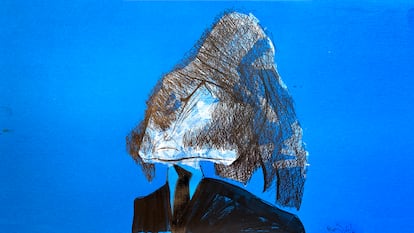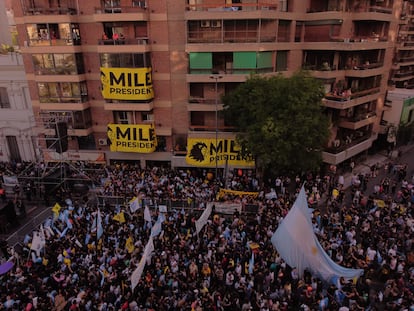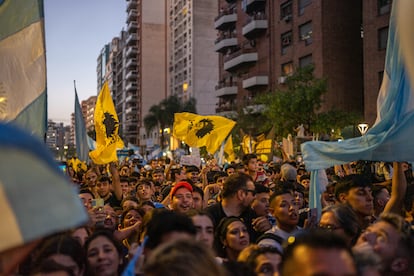Javier Milei, a mixture of a messianic preacher and a rock star
The economist and TV panelist — who is the far-right candidate for the presidency of Argentina — ended his campaign by abandoning his chainsaw and tempering his rhetoric and proposals to win over skeptical moderates


“The Lion” — his nickname — suddenly stopped roaring. Following the first round of the elections on October 22, this ultra-neoliberal economist — known for his insults and outbursts of anger in front of the cameras — began to remain calm, even when contradicted. He embraced the political class, after recently threatening that he was going to destroy it.
Over the past few weeks, the man with unchecked rhetoric started to self-censor. “We’re not going to privatize healthcare. We’re not going to privatize education. We’re not going to privatize soccer. We’re not going to allow the unrestricted carrying of weapons,” he promises, in his latest electoral advertisement. But only last month, the candidate of the far-right La Libertad Avanza (Liberty Advances) coalition was saying just the opposite. In fact, in his electoral platform, his vows to deregulate the arms market and privatize education through a voucher system are still present… However, since they’re not very popular, he switched to highlighting other proposals in the lead-up to the runoff election on Sunday, November 19. Milei aspires to take power and defeat the ruling party’s candidate, Minister of Economy Sergio Massa.
The rapid transformation of Milei — who, for two years, was seen as an extravagant outsider in the Chamber of Deputies — brings to mind one of the most famous phrases attributed to former Argentine President Carlos Menem: “If I had said what I was going to do, no one would have voted for me.” Between the first and second rounds of the campaign, Milei has backtracked on his support for the sale of organs, the sale of children, or allegations of electoral fraud. His innumerable contradictions now force Argentines to choose which of two versions of the same candidate to believe. If he wins, his true face will begin to be revealed starting on December 10, when the next presidential term begins.
Milei was born in Buenos Aires on October 22, 1970, in a middle-class home, the son of Norberto — a bus driver who ended up owning a transportation company — and Alicia, a housewife. Milei said that he was raised amid beatings, humiliations and verbal abuse. “Your sister is like this because of you; if she dies, it’s your fault,” his mother once told him, when his sister, Karina, suffered a panic attack upon witnessing one of those beatings.
“All those beatings that I received when I was a child mean that, today, I’m not afraid of anything,” Milei warned in a television interview. The beatings were accompanied by constant verbal abuse: “My father always told me that I was trash, that I was going to die of hunger and that I was going to be useless all my life.” As an adult, he cut the bond until the pandemic, when they met again.
Milei Sr. was present at his son’s campaign headquarters on the night of October 22, when Javier Milei was greeted with applause, cheers and a happy birthday song. That day, he turned 53. He received 7.7 million votes in the first round. “Javier is very intelligent,” said Norberto Milei. “I see him clearly. I hope he does well.” He watched the spectacle from the side, away from the spotlight.

Milei understands better than anyone the fatigue being experienced by Argentine society, given the successive economic crises and the lack of answers for millions of people. He speaks to those who work hard, but cannot make ends meet; to those who lock themselves in their homes when the sun goes down, because they’re afraid to go out; to those who evade all the taxes they can, because they worry about the future. He speaks to those who are upset that their children don’t have enough classes in their public schools and to those who have to wait for months just to see a medical specialist.
He jumped into politics in 2021, convinced that he had a mission: “End inflation forever, end insecurity forever, end the privileges of politicians forever.” In short, change Argentina forever, banishing Peronism, the center-left ideology that has often governed the country since the death of Juan Domingo Perón, who served as president twice (1946-55, 1973-74).
Milei promises that, if he’s given enough time in power, in 35 years, Argentina could be like the United States. In 40 years, it could be like Ireland. This is equivalent to ten presidential terms, although the Constitution of Argentina only allows for two consecutive ones.
Climate change denial
Milei’s proposed change includes combating the progressive ideas of a country that is at the forefront of Latin America when it comes to the achievement of social rights. He proposes repealing abortion — which has been legal in Argentina since 2020 — and has made derogatory remarks towards equal marriage, in effect since 2010. He denies the gender pay gap, which, according to the data, stands at a 26% disparity between Argentine men and women. He denies that climate change is caused by people. He proposes privatizing state-owned companies as well as Argentina’s natural resources, such as the hydrocarbons’ industry, the rivers and the sea. His argument is that, if the rivers have owners, they will no longer be polluted.
The support that the candidate has recently received from his parents doesn’t mean that they’re suddenly part of the inner-circle of the man who many have defined as lonely and distrustful. The only person close to him is his sister, Karina, whom he calls “The Boss,” as she’s the highest authority within his campaign. He also has Murray, Milton, Robert and Lucas — his “little four-legged children” — named after his favorite economists. They’re all clones of Conan: the mastiff he adored, who died in 2017. But death didn’t cut off communication between them: Conan and Milei speak to each other through a medium, according to his unauthorized biographer, Juan Luis González, author of El loco (The Crazy One).
After his victory in the primaries, he began a romance with TV celebrity Fátima Flórez, known for being a comedic imitator of former president and incumbent Vice President Cristina Fernández de Kirchner. Experts in non-verbal communication have analyzed this link to find out if it’s a real or fictitious relationship. However, it was veteran television host Mirtha Legrand who offered up a popular verdict while hosting them on her show: “You guys are strange, huh?” In their exchanges through social media, they type messages such as “I LOVE YOU” and “I AM YOUR LIONESS.” Gone are the intimacies revealed by Milei on TV years ago, when he claimed that he was a tantric sex teacher. Apparently, they called him a “bad cow” because he didn’t ejaculate more than once every three months.

In school, he was known as “The Crazy One” — a nickname also used by his soccer teammates in the second-tier clubs where he played the position of goalkeeper: Chacarita Juniors and San Lorenzo. His former classmates describe him as a withdrawn child, who didn’t like to socialize much. A similar description is given by those who shared an office with him at Corporación América, a conglomerate chaired by Eduardo Eurnekián. One of the richest men in Argentina, he is considered to be Milei’s his first godfather.
Everyone from his past agrees on Milei’s explosive temperament… an incessant source of problems to this day. “You’re a shitty communist, you’re ruining the country,” Milei once exploded in the elevator against a woman who asked him if he taught the work of British economist John Maynard Keynes in his classes. “Go away, you’re mistreating me,” he shouted at an EL PAÍS photographer, after he was asked to please smile for his portrait shot. Journalists and TV panelists — many of them women — are also on the long list of those who have been subjected to his outbursts of rage.
Charges of authoritarianism
His character reveals intransigent and authoritarian traits, quite worrying for someone who aspires to lead the country. He and his vice presidential candidate — Victoria Villarruel — deny the state terrorism and minimize the crimes against humanity perpetrated by Argentina’s last military dictatorship (1976-1983), referring to them as “excesses.”
“Milei is deeply undemocratic. He gets very upset when someone contradicts him. He doesn’t like it at all when he’s told something different from what he thinks, even if it’s said in a good way,” opines liberal lawyer and financial expert Carlos Maslatón. This former militant of La Libertad Avanza — now distanced from the candidate — offers an example from his radio program years ago. He expressed his disagreement over a financial instrument and Milei, furious, got up and left the show. It took three weeks to get him to come back. Maslatón believes that, behind this rudeness, there’s a “very insecure” person.”
Once, when Cecilia Moreau — president of the Chamber of Deputies — asked him to call her “president” and not “presidenta” (the feminine version of “president” in Spanish), he refused to do so. At the end of his speech, Milei stormed out of the chamber.
The alliance between Milei and Villarruel was advantageous for both. The first attracted voters dissatisfied with the country’s economic policies, while Villarruel added those who identify with extreme right-wing values, such as anti-abortion and anti-LGBTQ activists, as well as the opponents of the territorial demands made by Indigenous communities. Villarruel also helped Milei forge alliances with the global far-right, especially with the Spanish party Vox.
However, Milei’s emergence has widened Argentina’s political rift. Not even a space of high culture — such as the Colón, the most important theater in Buenos Aires — has been spared the extreme tensions that are palpable in the hours before the election. The candidate’s presence didn’t go unnoticed on Saturday, November 18. “Milei, you’re garbage, you’re the dictatorship,” part of the audience and the orchestra booed, when they recognized him sitting in a box. At the end of the performance, others chose to applaud him.
An enemy of the state
Milei’s first vocation was soccer, but Argentina’s hyperinflation in the late-1980s led him to swap his cleats for economics books. He graduated from the Faculty of Economics at the University of Belgrano, where he later also taught. He then did his postgraduate studies at the Institute of Economic Development and the Torcuato di Tella University. He studied Keynes’s ideas in depth… and then repudiated them over and over again.
As a liberal, he opposes any state intervention in the market. His rejection has been staged before the cameras through such violent metaphors that his rival — Minister of Economy Sergio Massa — has used them to delegitimize Milei. One such infamous phrase is: “The state is the pedophile in the kindergarten, with the children chained and bathed in Vaseline.”
This was how he defined the state in 2019, when he hadn’t yet entered politics. “If I had to choose between the state and the mafia, I would choose the mafia, because the mafia has codes, the mafia complies, the mafia doesn’t lie and, above all, the mafia competes,” he noted a year later.
Around that time, Milei appeared at a cosplay festival in Buenos Aires dressed as General AnCap (anarcho-capitalist) with a mask and a trident. “I come from Libertyland,” he announced, a country “where no one pays taxes.” “My mission is to kick the ass of Keynesians,” he proclaimed before the cameras and cosplayers. Four years later, that superhero from a fictional country leads the polls.
Milei entered and grew on the margins, like many populists before him. Social media helped him win over young people during the Covid-19 pandemic, especially those furious at a government that prevented them from going out due to strict lockdowns. They laughed at Milei’s bluster… but they also began to be convinced of the importance of the cultural battle that Milei was waging to change Argentina. From them, the words of the far-right candidate began to reach their parents and grandparents.
“My son became a fan of Milei and insists every day that my husband and I vote for him. But I don’t know, he’s crazy, we don’t know what he’ll do [if he’s in power],” admits a saleswoman at a stationery store in Buenos Aires. She’s among that 10% of undecided voters who could shift the final result.
Distrust is widespread among businesspeople, who are suspicious of the promised dollarization of an economy that doesn’t have any dollars. They fear the chaos it could cause. A hundred prestigious economists signed a letter rejecting this and other economic measures proposed by the candidate. On this point, though, his position remains unchanged. He has moderated himself on all fronts over the past few weeks, but he hasn’t touched his economic program. “I’m going to be the Minister of Economy,” he responded to one of his advisors, when he was asked to give a name for that key portfolio. Regardless, if he wins, he’ll likely have to appoint someone else to the role… but Milei plans for that minister to simply be an employee who follows his orders.
At his rallies, with his teenage post-punk look — messy hair and a leather jacket, even when the temperatures are hot — the 53-year-old Milei transforms into a mixture of a rock star and a messianic preacher. It’s his favorite environment. “Being at the center of attention in any situation — without the need to engage in a back-and-forth dialogue with those present — remains the place in which he feels most comfortable,” writes González, his unauthorized biographer. Since he was a child, Milei sought to occupy that place. In the schoolyard, he imitated the dances of his beloved Mick Jagger, without imagining that, decades later, thousands of people would chant along with him to the lyrics by a hard rock Argentine band: “I am the king of a lost world.”
“It’s difficult for him to be in a social gathering and maintain a relaxed dialogue with several people,” says liberal lawyer and financial expert Carlos Maslatón. Milei also doesn’t take kindly to being interrupted. “He likes to give a speech and leave,” he continues. The interaction may include shouting and chanting, but he doesn’t like to be part of a collective chat.
Milei is Catholic, but years ago, he began to approach Judaism. He doesn’t rule out converting to this faith in the future. During the presidential campaign, he said that his greatest reference is Moses.
Attacks on Pope Francis
Before entering politics, Milei made a living as a university lecturer and as an economist. He was an advisor to General Antonio Bussi — a member of the military dictatorship who became governor of the state of Tucumán in the late-1990s — and served as chief economist of the Acordar Foundation, which was set up by former left-wing presidential candidate Daniel Scioli. However, the most notable part of his CV was when he spent a decade working for Armenian-Argentine magnagate Eduardo Eurnekián. The billionaire gave him the media boost through his América TV channel, along with the contacts he needed for his political career. Later (at least publicly), he repented. “I have 3,700 employees in my company and one failed… what do you want me to do?” Eurnekián commented a few days ago.
The billionaire is apparently offended by Milei’s open criticism of Pope Francis, whom he has called an “imbecile” who has an “affinity for murderous communists.” Milei has even gone so far as to declare his fellow Argentine as “the representative of evil on Earth.” Eurnekián, in turn, scoffed that the candidate “isn’t up to the task of judging or giving an opinion about the pope.”
“They accuse us of having created a monster,” confesses a source from within the businessman’s empire. But if this is true, they weren’t the only ones. Former allies of Milei say that Massa’s entourage also lent him a hand in the initial compilation of legislative lists, in the hopes that Milei would divide the opposition vote and wear down the classic conservative right. “I thought he would get 15%, 18% at most,” someone from Massa’s campaign laments.
On October 22 — when Milei doubled that figure (he got 36.78% of the vote) and defeated the center-right Together for Change coalition — the man who extended a hand to the insurgent was former president Mauricio Macri (2015-2019). If he becomes president, Milei will need nearly 5,000 friends to occupy the most trusted positions in the state apparatus. He doesn’t have them, but Macri, a powerful businessman, is willing to introduce him to many. The risk is that this gives rise to a two-headed presidency, with one side facing the sun and the other lurking in the shadows.
The alliance between Macri and Milei has multiplied and diversified the right-wing candidate’s audience. Young men are no longer the vast majority — suddenly, there are also middle-aged and elderly men and women. While some see Milei as an affront to feminism and the rights of sexual minorities, many see him as a man who can save them from another four years of Peronism. The newcomers chant more timidly at Milei’s rallies than the veteran supporters… probably because they only showed up a month ago. They missed the show: Milei used to brandish a chainsaw, saying that he was going to “cut” the bureaucracy. But the chainsaw has now been replaced by a stuffed animal named “Pochita,” who’s a character from the Japanese manga Chainsaw Man. Pochita technically represents a demon… but based on his cute appearance, you wouldn’t know it.
Milei’s inexperience became visible like never before in the last debate against Massa. The Peronist candidate cornered him and dealt him one verbal blow after another in the form of questions. Milei tried to answer them as best as he could… but at the same time, the minister of finance — a career politician — fought a non-verbal battle. He demonstrated exemplary manners in front of the camera, never losing control. Massa exposed Milei’s lack of preparation to lead the country. However, the beating was so serious that many felt empathy for the fragile and doubtful economist.
Milei reached the final stretch of the campaign certain that only the risk of fraud — denied by the electoral authorities, independent organizations and international observers — stood between him and a victory at the polls. From Córdoba — the most anti-leftist province in Argentina — this fearless man asked Argentines to free themselves. “What risk are you talking about? What leap into the void? We’re going to hell!” His success depends on convincing the last doubters that what he says is actually true.
Sign up for our weekly newsletter to get more English-language news coverage from EL PAÍS USA Edition
Tu suscripción se está usando en otro dispositivo
¿Quieres añadir otro usuario a tu suscripción?
Si continúas leyendo en este dispositivo, no se podrá leer en el otro.
FlechaTu suscripción se está usando en otro dispositivo y solo puedes acceder a EL PAÍS desde un dispositivo a la vez.
Si quieres compartir tu cuenta, cambia tu suscripción a la modalidad Premium, así podrás añadir otro usuario. Cada uno accederá con su propia cuenta de email, lo que os permitirá personalizar vuestra experiencia en EL PAÍS.
¿Tienes una suscripción de empresa? Accede aquí para contratar más cuentas.
En el caso de no saber quién está usando tu cuenta, te recomendamos cambiar tu contraseña aquí.
Si decides continuar compartiendo tu cuenta, este mensaje se mostrará en tu dispositivo y en el de la otra persona que está usando tu cuenta de forma indefinida, afectando a tu experiencia de lectura. Puedes consultar aquí los términos y condiciones de la suscripción digital.








































